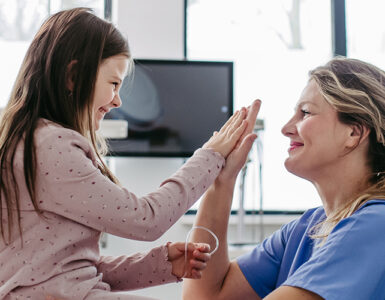As parents, we understand the importance of sleep for our kids. A lack of sleep can have a long list of negative effects, from behavioral problems to fatigue, trouble focusing, and poorer social functioning.
In the last twenty years, melatonin use among children has skyrocketed, becoming the second most popular “natural” product given to kids by their parents, after multivitamins. But is melatonin safe for kids and what else can be done to promote healthy sleep habits?
What is Melatonin?
Melatonin is a hormone that regulates the sleep-wake cycle, helping to signal the body that it’s time to sleep. The sleep aid supplements with melatonin typically contain synthetic versions of the hormone, which is chemically identical to the natural melatonin produced in the brain.
In the United States, melatonin is considered a “dietary supplement” that is not under FDA oversight like other over-the-counter medicines and prescription medications. The content in melatonin supplements can vary widely, with changes in potency and additional ingredients from one product to the next. Sometimes, the dose indicated on the product label isn’t correct and the use of other chemical ingredients isn’t listed.
Is Melatonin Safe for Kids?
While short-term use of melatonin at the appropriate dose is generally considered safe for children, it should only be done under the guidance of a pediatric doctor. Before turning to a melatonin supplement for sleep, be sure to address your nighttime routine and practice healthy sleep habits.
If you are using melatonin for your child, choose a “USP Verified” product, start at a low dose (0.5-1 milligram), and avoid giving it every night. Long-term melatonin use is not recommended, unless directed otherwise by a doctor. Children with neurodevelopment disorders such as autism spectrum disorder (ASD) or attention deficit hyperactivity disorder (ADHD) may benefit from melatonin with the guidance of a pediatrician.
In 2022, the American Academy of Sleep Medicine (AASM) issued a health advisory addressing the use of melatonin, stating that with the increased use of melatonin products, there have been growing reports of melatonin overdose, calls to poison control centers, and emergency room visits for children. This is exactly why choosing the right product and consulting with your doctor is so important.
Other Ways to Promote Better Sleep for Kids
While there are some exceptions, most sleep problems for children can be managed with a change in schedule, habits, and behaviors.
Before turning to over-the-counter products to promote better sleep for your children, first try these strategies:
- Stick to a regular sleep schedule with a consistent sleep and wake time
- Establish a calming bedtime routine, with bathing, reading, and other quiet activities
- Create a comforting environment in your child’s bedroom, providing a quiet, cool, and dark space to sleep
- Consider using a noise machine or soft music to create a relaxing atmosphere
- Remove screens and devices from your child’s bedroom, as the blue light emitted can stimulate the brain
- Acknowledge and address any anxieties or fears that may be affecting your child, and provide comfort and reassurance
- Plan for your child to engage in physical activity and spend time outdoors during the day, but avoid vigorous exercise close to bedtime
- Avoid naps for older children (generally five years old and up) who no longer need them
- Provide a filling, healthy dinner and avoid sugary snacks or treats in the evening












